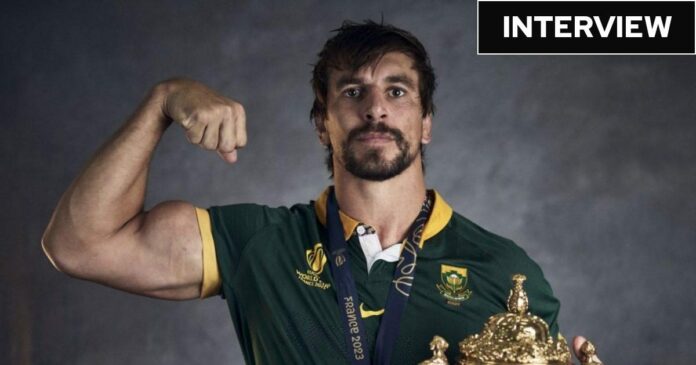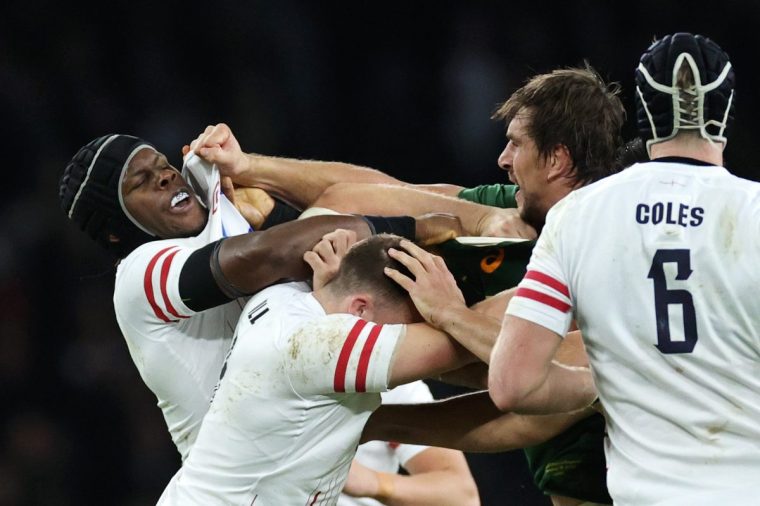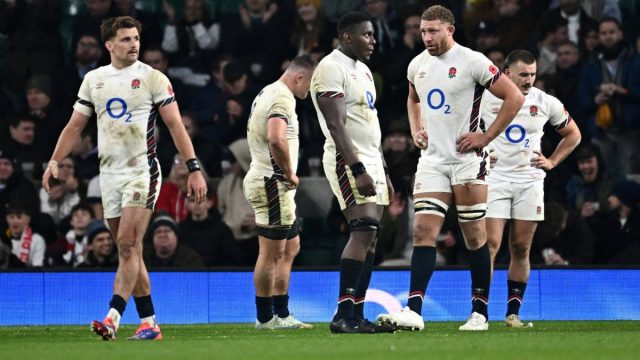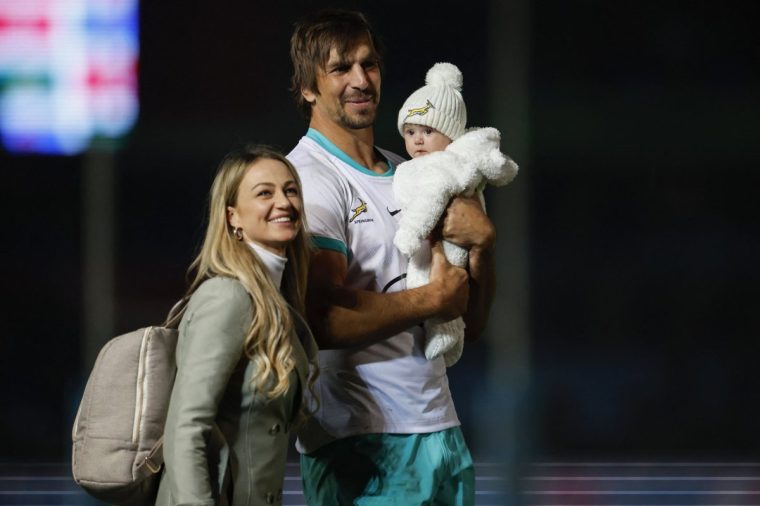
[ad_1]
Even in a seated position in a tranquil seaside hotel at the Springboks‘ training camp in Jersey, and wearing a jaunty bucket hat, Eben Etzebeth cuts a formidable figure.
This is partly down to sheer reputation: to know of him is to risk being in awe of him, although a smile – well, just a hint of one – soon appears under his broad, bashed-in nose and the floppy hair that, counter-intuitively, makes you think Florida frat boy more than one of the most admired and durable and consistent rugby players on the planet and, just recently, the most-capped South African of all time.
Simply to be Etzebeth, who will make his 130th Test appearance against England at Twickenham this Saturday, is to have survived and prospered in the most rigorous environment rugby has to offer: the second row of the Boks’ pack who have been the heart of the back-to-back World Cup winning teams of 2019 and 2023. And, moreover, in a country where the game is huge but also complicated in how it relates to their society.
Happily, any fear of grunted “yes” and “no” answers to i are immediately dispelled, by a question of whether the often-used word “enforcer” is fair, and one that he recognises?
Read Next
“I actually hate that word, to be honest,” Etzebeth says. “If you look at the [South Africa] team, and just look at the front row of Ox [Nche], Bongi [Mbonambi], Frans [Malherbe] – you’re telling me those three guys are not enforcers? That they don’t hurt the guys they play against every single week?
“Pieter-Steph [Du Toit], Jasper [Wiese], Siya [Kolisi] in his own way, his workrate and stuff. For me, it’s a selfish word to use, to point yourself out there as an enforcer.
“I just like to do what the team wants me to do and expect of me on a weekend, and if that is to try and impose yourself on a game and be physical, I try to do that.
“Enforcer? I feel us as a pack, the Springbok pack, all want to enforce together. So pointing a single one out, I am not a big fan of that.”
We are speaking the day before Etzebeth turns 33. Do his remaining ambitions include winning a third World Cup, a feat no man has managed?
“It’s definitely a goal,” he says. “The body needs to stay in shape.” And how about playing for an English club one day? He replies that he almost joined Bristol in 2016, on a short-term contract, which I cannot remember having been mentioned before.
“Anyway, I got a concussion, and it didn’t work,” Etzebeth says. “I ended up going to Japan for three months. Where I am now in my career, I can’t see it happening. But it’s definitely not impossible.”
 Etzebeth is looking forward to another tussle with England on Saturday (Photo: Getty)
Etzebeth is looking forward to another tussle with England on Saturday (Photo: Getty)
Where Eztebeth is, geographically and when not on tour, is living in Ballito, near Durban on the coast of the Indian Ocean, and playing domestically for the Sharks.
The sense of uniqueness about him was emphasised last Sunday when he was the only South Africa forward who played the full 80 minutes of the win over Scotland – the other seven were replaced by the much talked about “bomb squad”.
He has also delivered put-downs in podcasts, telling England’s Courtney Lawes he doesn’t know about South African rugby, and tauntingly alleging Ireland players told him they were already in the 2023 World Cup final when they beat South Africa in the pool stage.
Read Next

When Eztebeth and the Sharks thrashed Gloucester in the European Challenge Cup final at Tottenham last season, he was feted by fans, and gleefully lobbed their phones to and fro for a succession of selfies behind the posts.
Etzebeth and his wife Anila welcomed a baby daughter earlier this year. He has also earned top dollar in the past at Toulon, and his Instagram pages show an enviable existence. So let’s flip it round, and ask Etzebeth what rugby has given to him.
“The game has given me a life I never could have imagined as a kid, growing up in Goodwood [in Cape Town],” he says. “It changed my life: the places I’ve been to, and looking after my family in a good way, and spoiling them, and having a wonderful wife and kid, and knowing I can look after them, rugby has given me so much that I’ll be forever be thankful for.”
And is it a weight on his shoulders, the way the Springboks present themselves as transformative representatives of their country?
“You get used to it,” he says. “The Springbok team definitely have a big responsibility to show South Africa how things can be done. People in big cities, small cities, townships, farms, rich areas, guys from everywhere – how those guys can get together and be successful and work together.
 Etzebeth and his wife Anila welcomed a baby daughter this year (Photo: Getty)
Etzebeth and his wife Anila welcomed a baby daughter this year (Photo: Getty)
“Because in our team we’ve got Afrikaans-speaking guys who doesn’t come from farms, we’ve got guys who come from farms, we’ve got the English-speaking guys, we’ve got coloured guys who come from coloured communities, we’ve got black guys who come from townships.
“So that’s why I say everyone in South Africa can relate to someone, and to see their hero and their superstar performing on the big stage must be such a big motivator for everyone in South Africa to try also to achieve something in their life. We play for them and we can be role models for them.”
South Africa’s rivalry with England is fascinating. Alex Mitchell, the currently injured England scrum-half, said after the Boks won the World Cup semi-final by a point in Paris last year that hardly any swapping of jerseys went on; relations were too frosty.
Etzebeth claims no clear recollection of that but he says: “I remember in 2019 [when South Africa beat England in the final] I went over to their changing room and I swapped with Maro [Itoje]. The rivalry is definitely getting bigger, I would say, over the last six years. The Test match at Twickenham is going to be a big one.”
Ultimately, when you see Etzebeth grinning and grabbing the collar of Itoje, or Alun Wyn Jones on Lions tours, it boils down to one thing. “To pull on the green and gold is the biggest motivation,” he says. “To keep on playing for the Boks is so special.”
[ad_2]
Copyright for syndicated content belongs to the linked Source link

